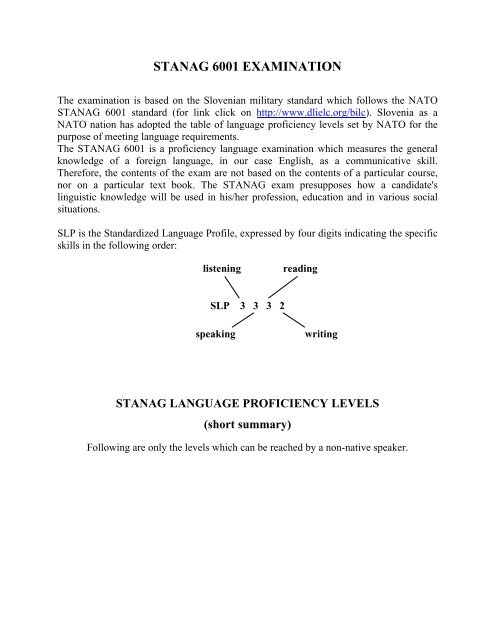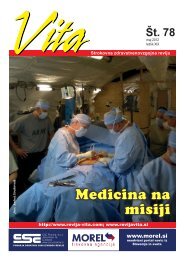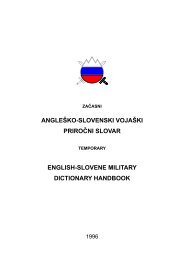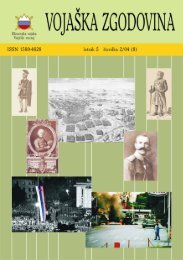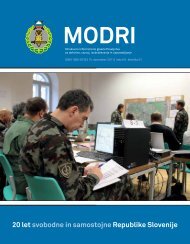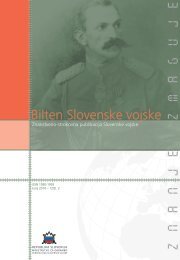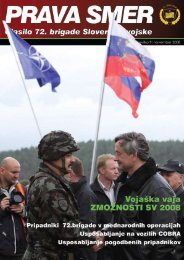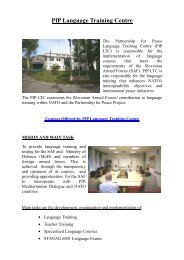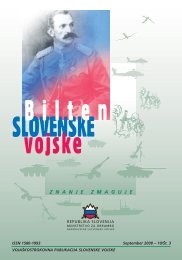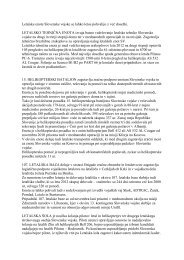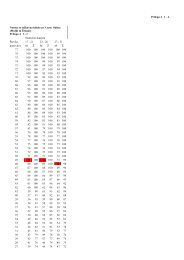STANAG 6001 exams - Slovenska vojska
STANAG 6001 exams - Slovenska vojska
STANAG 6001 exams - Slovenska vojska
- No tags were found...
Create successful ePaper yourself
Turn your PDF publications into a flip-book with our unique Google optimized e-Paper software.
<strong>STANAG</strong> <strong>6001</strong> EXAMINATIONThe examination is based on the Slovenian military standard which follows the NATO<strong>STANAG</strong> <strong>6001</strong> standard (for link click on http://www.dlielc.org/bilc). Slovenia as aNATO nation has adopted the table of language proficiency levels set by NATO for thepurpose of meeting language requirements.The <strong>STANAG</strong> <strong>6001</strong> is a proficiency language examination which measures the generalknowledge of a foreign language, in our case English, as a communicative skill.Therefore, the contents of the exam are not based on the contents of a particular course,nor on a particular text book. The <strong>STANAG</strong> exam presupposes how a candidate'slinguistic knowledge will be used in his/her profession, education and in various socialsituations.SLP is the Standardized Language Profile, expressed by four digits indicating the specificskills in the following order:listeningreadingSLP 3 3 3 2speakingwriting<strong>STANAG</strong> LANGUAGE PROFICIENCY LEVELS(short summary)Following are only the levels which can be reached by a non-native speaker.
<strong>STANAG</strong> 1Listening ComprehensionThe candidate can- understand common familiar phrases and short simple sentences about everydayneeds (minimum courtesy, travel, workplace),- understand concrete utterances, simple questions and answers, and very simpleconversations when spoken slowly.SpeakingThe candidate can- maintain simple face to face communication in typical everyday situations,- can create minimum courtesy phrases, exchange greetings, introduce himself andgive basic information,- can communicate about simple routine tasks.Reading ComprehensionThe candidate can- read very simple connected written material related to everyday survival situations,- read short notes, announcements, highly predictable descriptions of people, placesor things, simplified for non−natives.WritingThe candidate can- write lists, short notes, postcards, short personal letters in a loose collection ofsentences with frequent errors.
<strong>STANAG</strong> 2Listening ComprehensionThe candidate can- reliably understand face−to−face communication if the speech is in the standarddialect, delivered at a normal rate,- follow speech on general everyday topics,- follow speech on his/her special professional field.SpeakingThe candidate can- communicate in conversations on concrete everyday social topics and matters ofgeneral interest,- handle conversations on everyday events,- give basic information on his particular profession.Reading ComprehensionThe candidate can- read and understand concrete (not abstract) texts, such as newspaper articles onrecurring topics, simple biographies, social notices,- understand the main idea of routine business letters,- understand simple professional materials for the general reader,- understand the main idea of simple, authentic texts on a familiar topic.WritingThe candidate can- write simple private letters,- write routine workplace correspondence, such as memoranda, brief reports, buttexts may not always be clear.ANY OFFICIAL DOCUMENTS MUST BE PROOFREAD BY SOMEONECERTIFIED AT A HIGHER LINGUISTIC LEVEL
<strong>STANAG</strong> 3Listening ComprehensionThe candidate can understand- most formal and informal speech on practical and social topics and about his/herprofessional field,- the language at interactive meetings, briefings and other longer spokeninformation,- the essentials of conversations among educated native speakers, clear telephonecalls, television and radio programmes,- implicit and explicit spoken information.SpeakingThe candidate can- participate in conversations on practical, social and professional topics,- discuss abstract topics ( economics, culture, science),- clarify points, justify decisions, respond to challenges,- support his/her opinion,- hypothesize,- use the language clearly and naturally, without searching for words or phrases,- make ideas easily understandable to native speakers.Reading ComprehensionThe candidate can- understand authentic written material on general and professional subjects, news,informational and editorial items in major periodicals intended for educated nativereaders,- understand functions of language such as hypothesizing, supporting opinion,argumentation, clarification,- understand abstract concepts in texts on complex topics ( e.g. economics, culture,science, technology),- rarely misreads.
WritingThe candidate can- write informal correspondence and documents on practical, social and professionaltopics,- write about abstract concepts (economics, culture, science),- write essay−length argumentation, analyses, hypotheses,- write extensive explanation, narration and description.Listening Comprehension<strong>STANAG</strong> 4The candidate can understand- all forms and styles of speech from his/her professional field- highly sophisticated language, even on unfamiliar general or professional specialisttopics- language used in presenting official standpoints, lectures or negotiations- language specifically tailored for various types of audiences, including thatintended for persuasion, representation, and counselling,- very abstract ideas,- nuances of meaning, stylistic levels, irony and humour.SpeakingThe candidate can- communicate about abstract topics in fields such as economics, culture, scienceand technology, as well as from his/her own professional field,- readily tailor his/her use of language to communicate with all types of audiences,- speak effortlessly and smoothly, with a firm grasp of various levels of style, butwould seldom be perceived as a native speaker.Reading ComprehensionThe candidate can understand- all forms and styles of the written language used for professional purposes,- texts from unfamiliar general and professional specialist areas,- texts in newspapers, magazines and professional literature written for thewell−educated reader,- texts including highly abstract concepts,- stylistic nuances, irony and humour.
WritingThe candidate can write- all forms of texts from his/her professional field, including the representation of anofficial policy or point of view,- private letters, messages,- essays, where he/she presents, explains and advocates his/her point of view,- the final version of various forms of written communication.The candidate can write accurately and appropriately. He/she masters the organization ofwritten communication, various levels and styles, and can express nuances and shades ofmeaning.


